Kevin Bene, alto and soprano saxophones
Susanna Mendlow, cello
Ryan Ptasnik, drums
with Ainagul Abdikalikova, voice
Moyindau is a quartet that emerged from a collaboration between Alex Kreger and Ainagul Abdikalikova to set to music several poems by Kazakh poet Sabyrbek Nurmanuly. The group took its name, a Kazakh word meaning “acknowledgment,” from one of the poems’ titles. Moyindau’s self-titled album was released by the creative music cooperative Catalytic Sound in 2021.

Listen on Bandcamp -> Tap or Click Here
May 27, 2011
Ryan and I have made our way one continent closer to Central Asia, to Greece. We arrived in Thessaloniki yesterday and our wonderful hosts, Ermis and Angeliki, took us straight away up to their mountain home in Panagitsa near the border with the Republic of Macedonia. It’s beautiful here and we spent the day driving around the mountains, swimming in some hot springs, and cooking delicious meals from their garden. Tomorrow we’ll return to Thessaloniki and meet Mette, who’s flying in from Norway so that we can go to Istanbul and get our visas! And today we got our LOIs (letter of invitation) for Uzbekistan, which means we can apply and hopefully get the visas in a day. It’s a complicated process—one for a separate blog post.
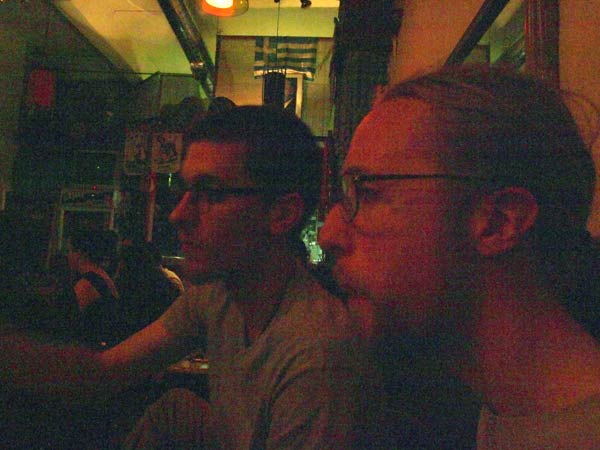

Before Greece, our first point of arrival was Sofia, Bulgaria, where we waited several days for our luggage to come—we were delayed in Chicago, missed our connection in Brussels, and got rerouted on Alitalia, which everyone told us is the worst for losing luggage. First thing out of the airport in Sofia, we got “controlled” on the bus heading downtown for not having tickets—we didn’t know how to buy them. We got kicked off the bus and luckily found ourselves right next to a currency exchange stand where we got Bulgarian leva to pay our fine. Still by the time we left Sofia we hadn’t figured out exactly how the public transportation works.
From Sofia, we hitched a ride south with a nice old man who spoke German with me, then caught another ride with Ivan, who drove out of his way to take us closer to the Greek border and set us up with a hotel room within walking distance from the border. After checking in, we walked down the road towards the lights at the border, in search of food. We finally found a food stand and two kind women (seemingly a mother and her daughter) patiently helped us figure out what we wanted to order. It took some difficulties to finally get our sandwiches, with a nice big chunk of Bulgarian feta in there. Once we did and we sat down to eat, I took one bite and figured out that the meat was barely cooked. I went back to them and tried to explain, but they insisted “no problem, no problem.” They showed us the bag with the frozen meat inside. We didn’t want to take chances, so we ate everything but the meat and left it in the trash in front of the stand. I waved goodbye to the girl at the stand; she waved back and then leaned over to look in the trash. We ran back to the hotel, got stuck in a thunderstorm, waited it out in a gas station, and finally made it back to the hotel, and were immediately hit up by the owner for more money than we had expected. We barely had enough to pay and emptied our pockets of all but 90 Bulgarian stotinki (cents). The next day we crossed the border on foot and caught a ride straight to Thessaloniki.
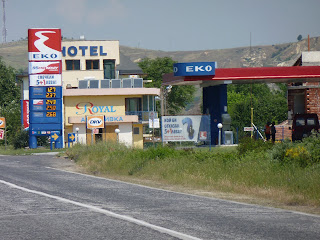
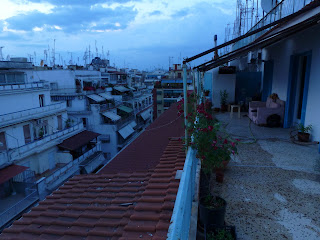
June 5, 2011
Ryan and I are getting ready to leave Istanbul this morning so I thought I’d take this opportunity to update the blog before our computer access becomes more limited.
We entered Istanbul on a night bus from Sofia. We didn’t mean to return to Sofia, but for some reason Greece suspended all international train service and the only bus office for service from Thessaloniki to Istanbul was closed. We had decided against hitchhiking as Mette was now with us, and between the three of us we had too many bags. So, while we were waiting for a city bus in Thessaloniki to take us to the airport, where we had planned to fly to Istanbul, the bus to Sofia pulled up and we got on, and five hours later we were back in that city for which I have so many mixed feelings, and two hours after that we were on the night bus to Istanbul, the same one I had taken two years earlier.
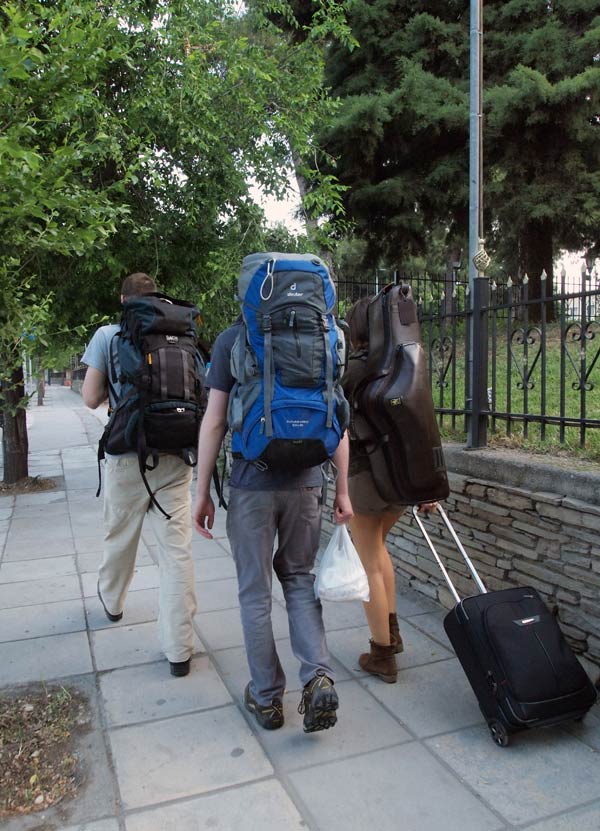
Two years ago, I spent the summer studying anthropology at Boğaziçi University in Istanbul. Over the course of nine weeks I fell in love with this enormous city of contrasts and contradictions, beautiful people, and incredible music and food. Together with my travels in eastern Turkey, it was my experiences here that led me to explore Central Asian culture and music. So, it is fitting that we began our tour here, where the seed for Moyindau was born.
We stayed in Kadıköy (on the Asian side) with our wonderful hosts Jim and Mehraneh. Jim is from New York and ended up back in Turkey after a 14-month trip that started in Istanbul and took him as far as southeast Asia. Now after several years living here he speaks fluent Turkish and works as an English teacher. The ease with which he navigates the cultural fabric of Istanbul and communicates with locals is inspiring and makes me want to spend more time here and learn Turkish. Mehraneh is from Iran’s Azerbaijan province and studies design. Her thesis is on the relationship hospital patients develop with the medical equipment they use, and how it is affected by the design of the instruments—very interesting. Together they make a beautiful couple, and we wish them all the best for their wedding next month!

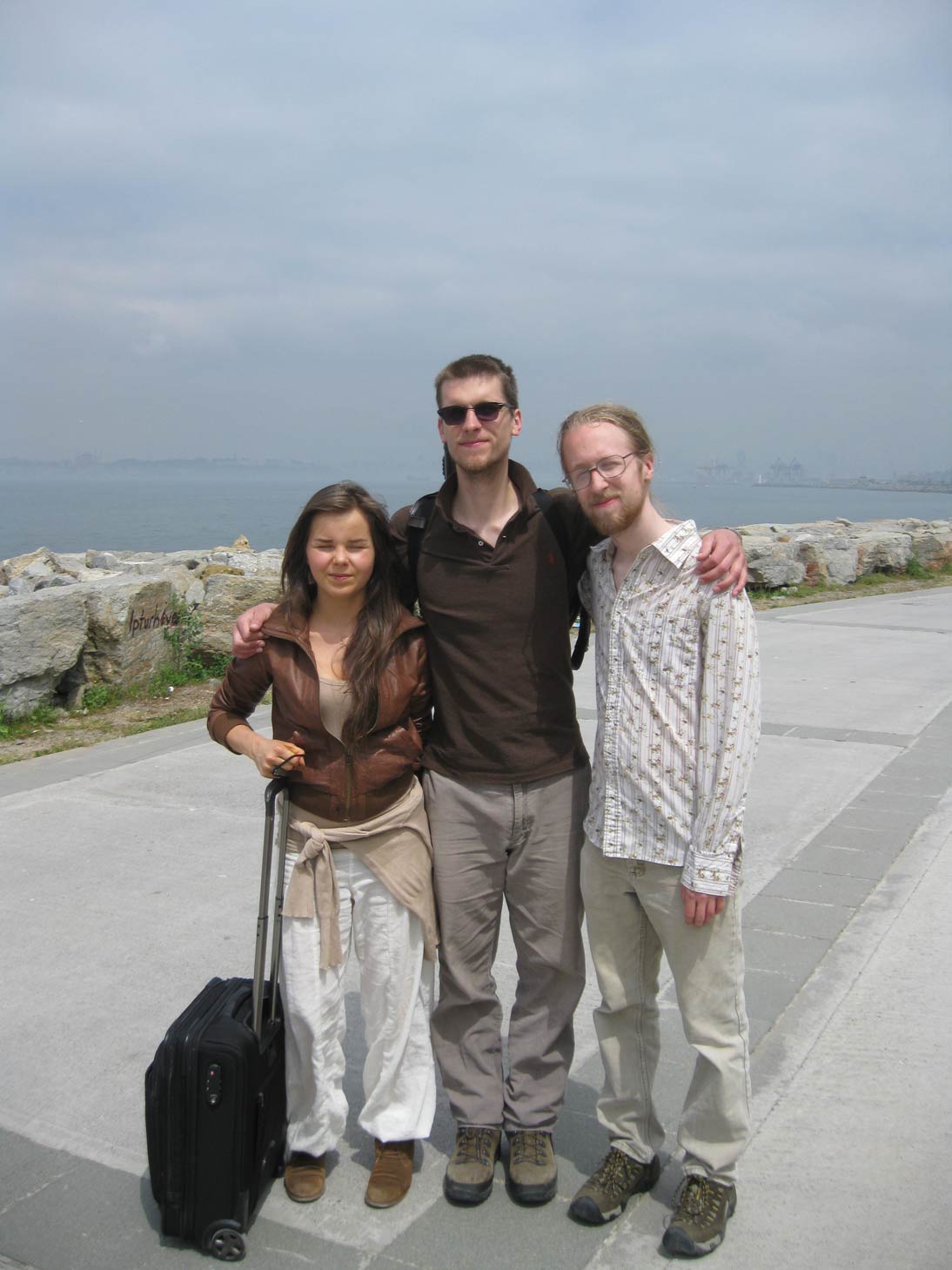
Wednesday’s gig at Nardis was a great success! We got the chance to play some brand-new compositions of mine as well as some older ones and a Tajik song, “Sitorai Man” by Ziyodullo Shahidi. We got recordings and a nice DVD video of the gig so I’m hoping we’ll be able to post something here soon! It was wonderful to play with Mette again. I am in awe of the focus and intensity she brings to the music and improvisation, the clarity of her ideas, and the urgency and vulnerability with which she can sing a melody. Serhan Erkol, a Turkish saxophonist from Istanbul, complemented her on alto, developing the motives and melodies that I had written in endlessly inventive ways that taught me a lot about improvisation and composition. He also took the time to show us around Istanbul and share many cups of tea and coffee, beers, bowls of “head soup” (kelle çorbası)—a late-night specialty that includes the brain of a cow or lamb; great times! And finally, Ryan, who held the entire group together with his fluid and flexible playing that can fit any situation. The group came together quite nicely, and I felt the audience really enjoyed it, except for one guy who complained that we didn’t play traditional Kazakh folk music and wanted his money back.
Before I conclude this blog post, I want to share a few special experiences that happened here in Istanbul. On our first day here, we made a trip up to Boğaziçi University to look into a potential rehearsal space. It turned out to be under construction, but the folks there went out of their way to help us. As we were heading out from campus, I stopped to buy water and put some money on my Akbil, a debit card for Istanbul public transportation. I handed the cashier a 50 lira bill—one lira for water and 30 liras to be put on the Akbil. He asked if I had a one-lira coin so he could give me 20 in change, and as I was reaching into my pocket, the woman behind me in line instantly put a lira down on the counter. I gave it back to her and paid my own lira, but her generosity touched me.
Yesterday, in a music shop in Kadıköy, I was reading through a book of Turkish folk songs at the piano when a guy came up and replaced the book on the stand with another—his arrangements of the same songs for piano. I started to read through those, then played a few jazz tunes, then his friend came and started to play some jazz and we shared music for a while. After two hours and some glasses of tea, the guy, a composition professor at Marmara University, offered me the book of his arrangements, signing it with the nicest note. Then we went and ate the best mantı (Turkish ravioli) I’ve ever experienced in my life.
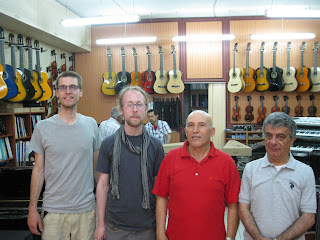
June 14, 2011
It’s been a busy week or so on the road since we left Istanbul. All the sudden now, we’re in northern Europe, Riga, checking out the city during our 14-hour layover. It’s a nice change of pace before we dive into Central Asia.
It was a bit sad to leave Istanbul, but I was excited to experience the east of Turkey again. We took an overnight bus to Yozgat, a town in central Anatolia that we chose because it was a seven-hour ride away—just enough to spend the night on the bus. From there, we hitched eastward, our goal being the town of Doğubeyazıt, which sits beneath Mt. Ararat at the very eastern end of Turkey. Before we made it there, however, we were invited by some Kurdish folks to the hot springs in Diyadın, a town about 40 minutes west of Doğubeyazıt. I had been there two years earlier, for a picnic with some old Kurdish men we met in Doğubeyazıt. But I had only seen it at night in the dark, so I when I saw the whole thing in the late afternoon light it was quite beautiful. On the way home from the hot springs, our gracious host and driver Berat discovered that his motorcycle had been stolen. Since my Turkish is pretty bad it took us a while to understand what the situation was, but we drove all around town, picking up people and dropping them off, stopping at the police station and then at a restaurant where Berat treated us to a delicious meal of meat in a tomato sauce (güveç). We were out of cash, and our cards didn’t work in the local ATMs, so they put us up for free as guests in a hotel and bought us a ticket on the minibus to Doğubeyazıt the next morning.
After Doğubeyazıt we continued north. We were traveling the same roads I had traveled two years earlier during my trip to eastern Turkey. In the next town, Iğdır, we got stuck in a downpour that lasted more than an hour until Yılmaz, a retired boxer, gave us a ride north to his hometown of Tuzluca, where he treated us to Turkish pide. We ate together in the dark because the power had gone out. Then we went back out into the rain, trying to hitch a ride out of town, and eventually gave up and accepted a generous Kurdish mother’s invitation to join her and her family for tea. We climbed the stairs to their apartment and drank endless tea, ate bread, and smiled and laughed with the extended family of six or so kids and two mothers, an aunt, and an uncle. Some were Kurdish and some were Turkish, and though each were proud of their heritage, they bonded together in love and friendship. It is difficult to describe how beautiful that experience was, but when I get to another computer I’ll upload some photos that might give an idea.
The next morning, we started hitching early and made it to Georgia by mid-afternoon. We stopped in the first town across the Turkish border, Akhaltsikhe, and ended up staying there two days, absorbing the new culture. Things were inexpensive for us there—the two of us ate a huge, delicious meal for 12 Georgian lari total, something like eight dollars. The second day in Georgia we went to Vardzia, an impressive cave monastery, where we met a group of high school kids on an end-of-the-year field trip. They took a liking to us and invited us to ride their tour bus with them back to Akhaltsikhe. On the way one of the students sang Georgian folk songs, accompanying himself on guitar. A crowd of students formed a circle around him in the back of the bus, and Ryan played darbuka along with him. His voice was beautiful and the songs very moving; the experience reminded me of my own past high school trips.
We spent the last two days in Tbilisi, staying with our host Koka, an air traffic controller at Tbilisi airport. One day we made a trip to Kazbegi, where we hiked to a monastery perched atop a mountain. At the top, you are standing at the same level as the clouds, and the views are incredible. It was one of the most beautiful places I have ever experienced. Yesterday, I had the wonderful opportunity to play two of Stockhausen’s Klavierstücke for a wonderful Georgian pianist named Nino Zhvania, a friend of a Georgian friend of mine from MSU. She gave me incredible insight into performing contemporary music, applicable far beyond any specific repertoire. Afterwards, she gave Ryan and me a walking tour of the city, and we climbed to a castle on the top of a hill with a view overlooking Tbilisi. I hope to come back to Georgia someday soon—five days was not enough to experience the great variety of natural beauty that the country offers and the warm hospitality of the Georgian people.
So tomorrow, Dushanbe! Performances at the orphanage and the US-Embassy public affairs officer’s house on the 17th, Bactria Cultural Center on the 18th, and the Shahidi Museum on the 19th. I can’t wait to meet the Tajik musicians and to play again with Mette and Ryan. I will post some pictures from the past week in a few days.
June 29, 2011
Describing the complexities of the Uzbekistan visa application process in comparison to Tajikistan’s, I told our host Jim in Istanbul, “Tajikistan is easy.” He laughed and it became a sort of joke that was brought up again and again. “Just remember that when things go wrong,” he said, and I tried to imagine what could go wrong—any number of things, of course. Now, getting ready to leave Dushanbe and head to Uzbekistan tomorrow, I can say that we had plenty of difficulties, but they didn’t come close to overshadowing the many wonderful experiences we’ve had here.
Our flight arrived in Dushanbe at 3:30 am and we waited in line to apply for our visas, but it was the wrong line. Then we entered a room where foreigners were applying for visas, and we had read up on the requirements beforehand so we were prepared. Even still, the process didn’t go as planned—the consul officer wanted to know why we didn’t have a letter of invitation from the US Embassy if they were funding our trip. (We had one from the Shahidi Museum instead.) He tried calling the embassy and Munira Shahidi, but of course at 4 am he didn’t get through, so he made us wait longer, questioned us as to our reasons for visiting Tajikistan, and asked Ryan three consecutive times if he had been in the military, to which Ryan replied “no” each time. Finally, he issued us “service” visas for almost double the cost of a tourist visa. We later found out that we had to register these visas, which cost an additional 50 dollars each. Luckily, we were getting support from the embassy. Our host Kirill was waiting for us after this whole process and he drove us back to his place, where we found our beds and crashed.
Dushanbe is hot. We spent a lot of time just hanging out at Kirill’s place in the garden. His house is actually two separate buildings, with a beautiful garden space in between. Ryan and I had one of the buildings to ourselves, and there was a piano in our bedroom, so I practiced and we rehearsed as a group there. Mette stayed in her own room in the main building. Kirill is from Tashkent, but he’s lived in Dushanbe for the past few years, bringing great music to the city through his job as music director of the Bactria Cultural Center. Bactria is a wonderful organization that offers language courses in English, French, and German, and organizes film screenings, concerts, and other events that bring international culture to Dushanbe. In addition to organizing our concert, they’ve collaborated with the French embassy to bring a French jazz group to town. They will perform tonight outside of the opera house—I’m excited to see it. Kirill’s wife Siyma is from Istanbul and works for UNICEF in Dushanbe. They have two kids, four-year-old Asya and two-year-old Pamir. Asya speaks Russian, Turkish, and English and wants to learn Tajik—I’m impressed! The nannies that take care of the children during the day are also super nice, and I try to practice speaking Russian with them.
Our first event in Dushanbe was an informal concert/party organized by the US Embassy at the temporary public affairs officer James Callahan’s house. Mette got sick that day, so we went to play as a duo. Many Tajik musicians came, and a drum teacher from a local music school brought a few of his students. I had fun playing with each of them, and one of them challenged me to improvise Tajik dance music in 7/8 time while everyone danced. Ryan and I played “Sitorai Man,” a beautiful melody by Ziyodullo Shahidi that has turned out to be an excellent vehicle for improvisation. Later that night I met a lot of foreigners living in Dushanbe—one British student who had been learning Farsi in Tehran for three months before the Iranian government kicked him out and he relocated to Tajikistan, an Iranian filmmaker who was finishing up a documentary on Dushanbe’s heavy metal scene before he planned to move to Berlin, and an American backpacker who had begun his trip in China in January and who we’d run into again down the road at a hostel in Khorog.
The next day we played the big concert at Bactria Cultural Center. Mette was feeling better, but Ryan had gotten sick with a stomach bug. We played some new compositions and arrangements for the first time—“Shunidam” and “Sitorai Man” by Ziyodullo Shahidi and a folk song called “Kashkarchay Savti Chorgokh” that I’d transcribed from a YouTube clip that’s since been taken down. Everyone sounded great. I learned a lot about my own playing, and saw many possibilities for future directions. Hopefully someday we’ll have time to work through more music with this group. The fifty or so people in the audience, mostly local Tajiks, received it very well.
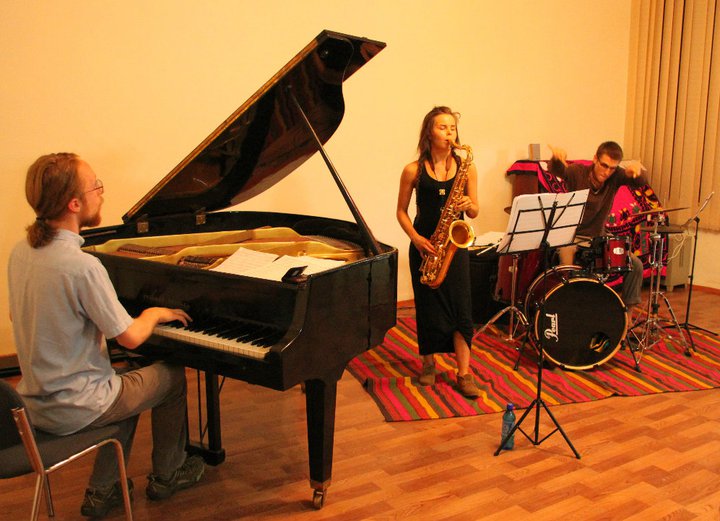
The next day was our show at the Ziyodullo Shahidi Museum. Since December I had been corresponding via email with Munira Shahidi, the daughter of the famous composer, and it was great to finally meet her and her daughter who is also a fine composer living in Montreal. Unfortunately, Munira’s husband had passed away only two weeks before, and instead of presenting a concert we were invited to perform at his memorial service. Several people spoke and Tajik musicians presented some of Shahidi’s songs, including “Shunidam.” Everyone brought their memories and their sadness, and I was moved by the beautiful music that within this family was so personal, yet also spoke for many in Tajikistan, and had spoken to me back in America. We did our best to respect the atmosphere and offer our own, honest musical contribution. Mette came and played the melodies with such care and tenderness even though she was once again sick and had been lying in bed all day. Just this evening, I met again with Munira and we discussed hopes for future projects involving Tajik and Sufi music, the songs of Shahidi, and contemporary improvised music.
The next day we left for Khorog, in Badakhshan. It took a full 24 hours to get there, with frequent stops for meals, car breakdowns and repairs, and even random roadside dance parties. When we finally pulled into Khorog, Ryan and I wandered down the main street until we discovered a poster with our pictures on it! Two Tajiks were examining it and we walked up to join them. They glanced at us, then back at the poster; recognizing us, they smiled. One of them lent us his phone so we could call our contact in town, while the other offered us a place to stay. We went to the theater and set up, having given up hope of sleeping before the concert. Then we waited—the show began more than an hour late. We had a good, very enthusiastic crowd of 150 people or so. They cheered wildly when the curtain opened, and during the performance whenever we did something flashy or in unison. The sound engineers cranked the volume way up and insisted on turning on the disco light. Ryan was playing the only drumset in Badakhshan, and I was playing a 60-something-key keyboard without weighted keys or a pedal. So musically, it was far from ideal, but we managed to present our music and the audience enjoyed it.

The following three days we spent in Dasht, a small village surrounded by mountains just outside of Khorog. Just adjacent to the village is the future site of one of three University of Central Asia campuses (the other two are in Kazakhstan and Kyrgyzstan). Now it is just an empty plot of land, but soon it promises to be one of the most beautiful university campuses in the world. Our host in Dasht was Musi, a 20-year-old English student at Khorog State University. His father was a driver in the Pamirs, and he has a younger sister Anisa in eighth grade. His family adopted us, fed us, and we got to experience their daily life in Dasht village. On our first morning there, I felt sick, but a bunch of kids from the village came over and we played music together with my keyboard and Ryan’s cymbals. The young kids taught me some Pamiri rhythms, some of which are quite challenging. Later that day we saw a rehearsal for a holiday celebration that would occur the following day, honoring the Aga Khan, the Ismaili people’s Swiss-born spiritual leader, or imam. The efforts of the Aga Khan Foundation were instrumental in saving Badakhshan from starvation during the Tajik Civil War of 1993-97, giving rise to a strong devotion to the imam in the region.
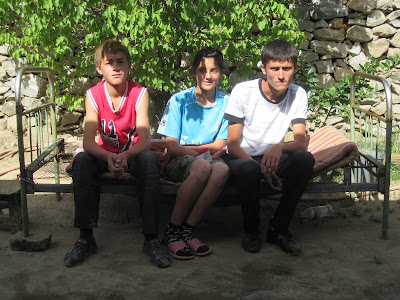
That evening we played volleyball with the village kids. It seems that volleyball is the game of choice, at least in Dasht, and some of the kids were very good at it. The younger ones watched and cheered from the sidelines. Musi told us that they played volleyball like this every evening from five or six until dark. We noticed that their volleyball was deflated and broken so we decided to go to the store the next day to buy them a new one. In the evening, then, we got to see the holiday celebration—all the children in their traditional dress, the dances, and little skits that the kids had worked out that delighted the audience with jokes and parodies. As we walked back to the house that night, the stars shone brightly in the sky and illuminated the mountains on all sides of the village, which was completely dark—we had to use a flashlight to show the way.
The next day Ryan and I said goodbye to Musi and his family and sat in Khorog’s Central Park to discuss our past experiences and future plans. We were starting to miss having daily contact with our instruments, and we were both hungry to work out new ideas and challenges. By the end of the day we had made some big decisions—but I’ll have to write more about that later because I’m tired right now and tomorrow we are leaving for Uzbekistan!

July 5, 2011
So that day in the park in Khorog we decided to go to China. We booked a pair of tickets to Beijing, and we’re going to work our way back west towards Central Asia to meet up with Susanna and Kevin in Kyrgyzstan on July 30. We fly out of Tashkent on Friday.
After booking the flights, we hired a driver to take us to the Wakhan Valley. The entire route follows the Pyanj River, which delineates the border with Afghanistan. At times the valley is so narrow that there is room only for the road and the raging river between two giant faces of rock. Other times the valley widens and the river spreads out and the water appears to stand still, and when you look across you can barely see the massive Hindu Kush mountains because of all the dust in the air, which turns the sky a greenish-brownish-gray color at dusk when the wind blows into your eyes and shakes the tall poplars that grow along the side of the road. Families dressed in red sit by the roadside and smile as we pass. Our final destination was Vrang, our driver’s village, but we broke our journey and spent the night at a homestay at the top of one of the mountains. I got sick that night, but the squat toilet was in quite good condition and our host family was kind, so I still enjoyed myself. The next day we continued to Vrang, stopping at some hot springs, the museum of a Sufi musician at Yamg village, and a Buddhist stupa at Vrang. In Vrang, we had planned to stay for free at our driver’s house, but it turned out to be all the way at the top of a mountain—a two-hour hike—so we paid instead for another homestay, because our driver insisted that we needed to leave at 5 am the next morning in order for him to find enough passengers who wanted to share the ride to Dushanbe.

We woke up at 5 am the next morning and said goodbye to Eric, our friend from Colorado who we’d met at the US Embassy’s event for us in Dushanbe, and then again later in Khorog at a guesthouse. We had decided to travel together to share stories—he was a guitarist and interested in jazz, but hadn’t taken the time or made the decision to pursue it professionally or to the extent we had. I was interested in his travels. He had started in January in Hong Kong, spent three months in China, and biked through Kyrgyzstan to Tajikistan—all with his guitar, onto which he had carved the phrase “you reap what you sow” in Chinese, Russian, and Farsi. He made his own phrase books and taught himself the language of each country he visited. Before we parted ways, he made us a Chinese phrase book from memory, quite extensive and impressive considering he had taught it all to himself.
The drive back to Dushanbe took more than 24 hours. We were glad to make it back to Kirill’s place, where Goulya, the children’s caretaker, welcomed us back and made our beds for us and offered us food. The next day we met Munira Shahidi and discussed further plans for exploring the relationship between Sufi traditions, poetry, and music and contemporary Western music and improvisation—focusing on Tajikistan as a meeting place of these two spheres. She gave me a collection of Shahidi’s songs arranged for piano and voice, as well as a CD that had just been published with a booklet of liner notes that, I realized, were the same paragraphs she had sent me earlier this spring to edit! We discussed possibilities for a lecture concert series in London later this year or early next year. It was an exciting conversation and I left full of ideas for future projects and exploration.
That night Kirill and Bactria, in collaboration with the French embassy, put on a wonderful outdoor concert in front of the Opera Theater. It was fun to see live music again and they had a wonderful turnout. Afterwards, we went out for dinner with Siyma at a Ukrainian restaurant. I felt that I could stay a few more days in Dushanbe; I had made some friends there. But we had to go so that we could spend some time in Uzbekistan. The next morning, we met a young Dutch couple at the Rudaki statue to share a taxi to the Uzbek border. We had met them earlier at a Khorog guesthouse and ran into them by chance at an Internet Cafe in Dushanbe while I was typing the last blog post. We continued together to Tashkent, where we spent the night at what Lonely Planet described as “the darkest hole in all of Central Asia”—in fact, it wasn’t so bad.
The border crossing was relatively painless. They searched my entire bag, and had me play two songs when they discovered I had a mini-keyboard. They asked me two questions: “Why are you so white?” and “Why don’t you have a girlfriend?” They laughed and joked when I put sunscreen on before heading out into Uzbekistan—we were in the valley now, you could barely see mountains on the horizon, and the sun was hot.
The next day in Tashkent, we went early to the Chinese embassy to apply for our visas. We got them in one day, but it was expensive. In the evening, we met Couchsurfers Nuriya and Khoorshid, whose nickname was Mega. They were so kind and took us to the train station to help us buy tickets to Nukus. Then we changed money. In Uzbekistan, almost anybody is a currency exchanger—this time our taxi driver pulled out a bag of bills from his trunk to trade for our hundred-dollar bill. One US dollar is equal to approximately 2,450 Uzbek som on the black market, and the largest som bill is 1,000. So, we stashed a giant wad of cash in our bags, and each time we go to a restaurant we count out more than 20 1,000-som bills to pay.
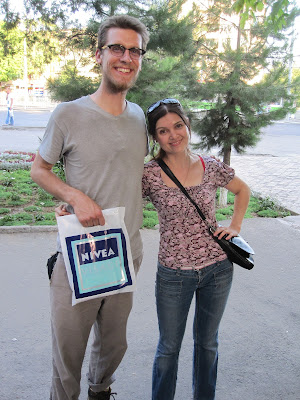
Nuriya and Khoorshid treated us to a wonderful dinner and then saw us off on the train, 21 hours across the desert to Nukus, the capital of the autonomous republic of Karakalpakstan where the langauge, Karakalpak, shares more in common with Kazakh than with Uzbek. It was my first overnight train ride, and for a pretty fair price we got a comfortable bed on the top bunk where we slept at night and then lounged all day long, watching the bleak desert speed past us and wondering if it would be so unforgiving at the place where we would be getting off. It turned out that it was—but we still had a great experience in Karakalpakstan.
Now we are in Khiva, waiting for the midday heat to subside before we check out the ancient walled city. Next blog post I’ll describe the rest of our week in Uzbekistan, before we head east yet again.